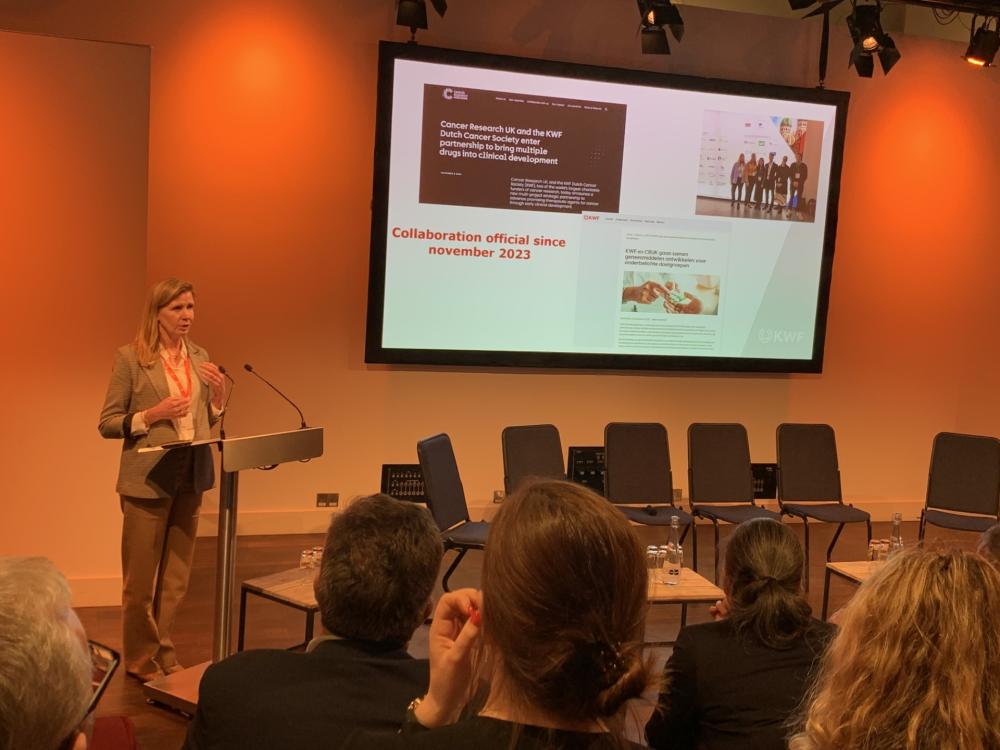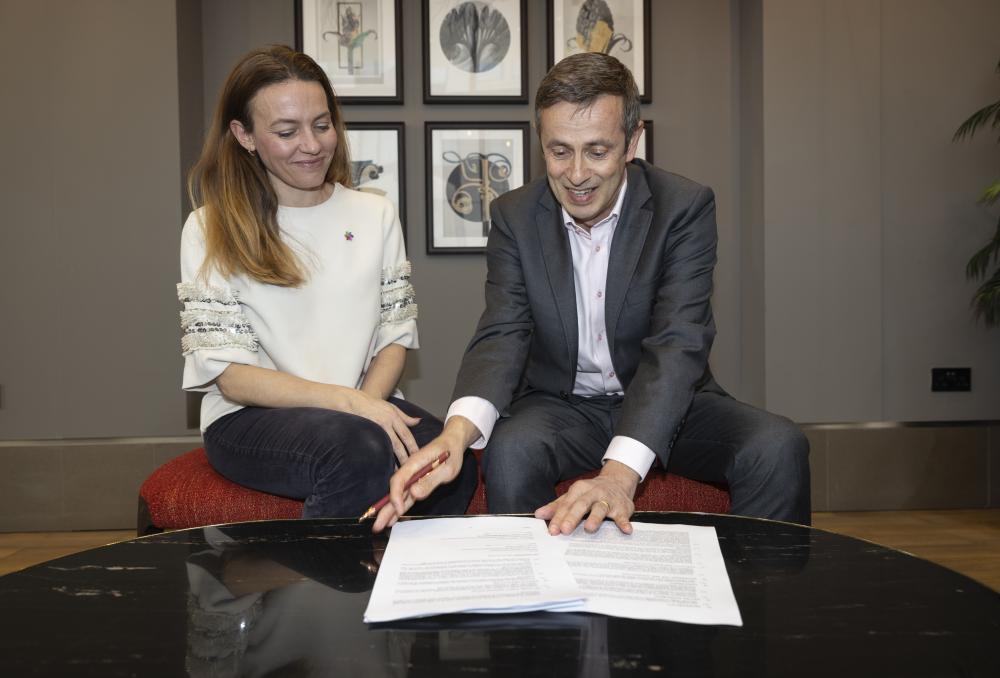Beyond borders: going global with clinical trials
Since becoming director of Cancer Research UK’s Centre for Drug Development in February 2024, I've witnessed the need for global collaboration in clinical trials. Here's how international partnerships between research charities can do this by pooling resources, expertise and patients.
- 20 May 2024
- Lars Erwig, Director of Cancer Research UK's Centre for Drug Development
- 6 minute read

Recruiting patients to clinical trials is an enormous challenge. It can take up to 30% of the drug development timeline and still around one in four cancer trials are under-enrolled. One reason for this is that as new cancer treatments have become more targeted, the eligibility criteria of clinical trials have narrowed. Now, as well as needing to be in the right age group, with the right treatment history and tumour type, at the right stage, patients also need to have specific biomarkers or genetic alterations to take part in a particular study.
For paediatric and rare cancers, where patient numbers are lower, the recruitment challenge is even greater. Combined with the low incentive for the pharmaceutical industry to develop new medicines for smaller patient populations, this results in a significant unmet need. The five-year survival rate for people with rare cancers is around 20% lower than those with common cancers. Orphan drug designations encourage more investment in rare diseases, but there is still a gap in available treatments. Non-profit organisations will be crucial to filling that gap. If we do not fund these trials, no one else will.
With median costs for a single oncology trial at around $5m for Phase 1, $11m for Phase 2, and $22m for Phase 3, it is difficult for non-profits to fund them on their own. How can these organisations get enough resources to fund these trials while also making patient recruitment easier?
One solution is to collaborate internationally. Partnerships between organisations in different countries allow them to pool funding, resources and expertise. It also broadens the potential patient population and opens up trial sites in one country to another, accelerating trial execution and bringing new therapies to patients faster.
If we do not fund these trials, no one else will.
Several organisations across Europe promote and facilitate international collaboration on clinical trials, including the European Clinical Research Infrastructure Network and the European Organisation for Research and Treatment of Cancer. However, Brexit has cost the UK its access to the European Union’s clinical trial database and made it less attractive for clinicians to work here. It is therefore more important than ever for us to forge our own collaborations across the continent.
Cancer Research UK’s Centre for Drug Development (CDD) began partnerships with two leading cancer research charities that share our vision: KWF Dutch Cancer Society (KWF) in November 2023 and the Norwegian Cancer Society (NCS) in March 2024. The CDD is the world’s only charity-funded drug development facility, specialised in running early phase clinical trials. The expertise and resources of KWF and NCS will complement the CDD’s and enable trials to happen that otherwise wouldn’t. The groundwork for these agreements began long before I joined as CDD’s director in February 2024, but I am excited to guide the collaborations towards bringing new treatments to patients with fewer options available.
The new partnerships will use the CDD infrastructure to get more innovative treatments from academia into clinical trials, benefiting patients both in the UK and internationally. This does not mean that the CDD is deserting the UK to run trials in the Netherlands and Norway. It has access to world-leading sites, scientists and clinicians across the UK through the Experimental Cancer Medicine Centres network, which will remain integral to its ability to run clinical trials. Our new partners will add to those resources, not replace them.
The first trial under the partnership with KWF focuses on improving radioligand therapy outcomes for children with neuroblastoma, a rare cancer that accounts for around 6% of total childhood cancer diagnoses. “This trial is a powerful example of our joint efforts,” says Carla van Gils, Director of KWF. “Together, we can bring breakthrough solutions like this to the patient that might otherwise go unaddressed.”

This is a follow-on trial to a previous Cancer Research UK-sponsored study that, despite promising results, couldn’t progress because of a loss in manufacturing capabilities within the UK. With the wealth of nuclear medicine expertise in the Netherlands and extra funding from KWF to support a clinical trial, the CDD can continue working towards this unmet need. The project team also aims to reestablish the UK manufacture of the isotopes required for the study by working with Radionuclides for Health UK.
Together, we can bring breakthrough solutions like this to the patient that might otherwise go unaddressed.
In early 2025, we aim to open European sites outside the UK in the first trial under the NCS partnership, which will capitalise on the networks of both research charities. “The timing of this collaboration is perfect,” says Ingrid Stenstadvold Ross, CEO of NCS. “We have just entered a new strategic period where one of our key goals is to ensure that promising innovations reach patients faster. Partnering up with the CDD has given us a unique opportunity to fulfil this ambition. Through this collaboration, we will achieve much more than we could have done on our own.”

Norway has strong expertise in cell therapy, which the CDD will aim to draw on as the partnership progresses. Since CAR T-cell therapies became available on the NHS in 2023, there has been a growth in UK-led trials in this area. “We truly believe that charity-led drug development provides significant advantages,” says Ingrid, “especially that we can take on projects that have high potential patient benefit but are too financially risky for the industry, for example in rare cancers.”
What’s on the horizon for the CDD? We are already in clinical development collaborations with industry partners based all over the world, from San Francisco to Singapore, but up until now we have exclusively used UK sites and UK patients. A major barrier to expanding trials to another country is the added complexity that different regulations bring. The local networks of our Dutch and Norwegian partners will help to overcome this barrier. Once the CDD demonstrates its operational expertise on the international stage, we hope to see more partnerships like this in the future, bringing the expertise and resources needed to conduct larger, more complex trials.
We can take on projects that have high potential patient benefit but are too financially risky for the industry.
The UK is still slower to deliver clinical trials than most of its neighbours, according to a UK Government report. Spain now leads Europe, but we are all still far behind the US, which benefits from centralised administration across a large, diverse patient population. This is why it is even more important that we explore global approaches that can accelerate clinical trials, and ultimately bring new treatments to patients.



